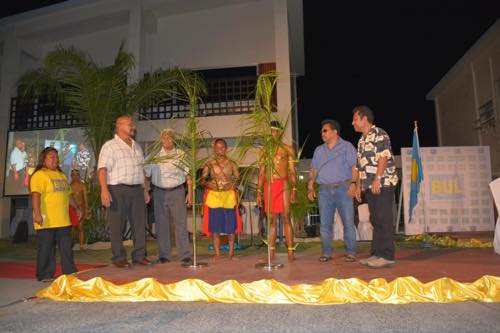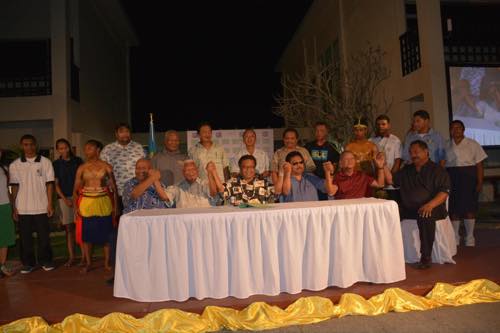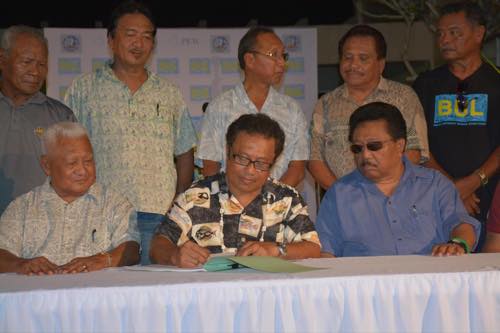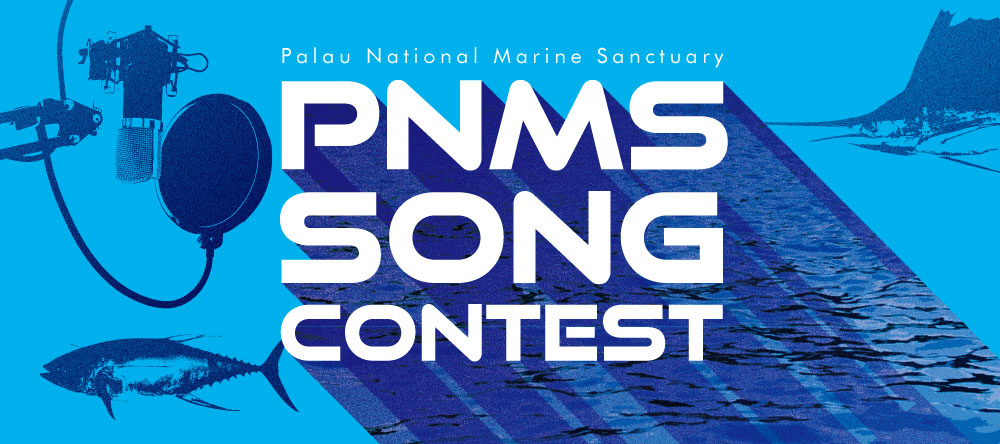- Other
PNMS Information
Extracted from: Palau International Coral Reef Center and the Stanford Center for Ocean Solutions, “Palau’s National Marine Sanctuary: Managing Ocean Change and Supporting Food Security,” PICRC, December 2019. Available at:
PNMS – PICRC website https://picrc.org/picrcpage/palau-national-marine-sanctuary/ Stanford – Center Ocean Solution https://oceansolutions.stanford.edu/pnms-report
Background
In 2015, Palau embarked on an extraordinary journey, announcing protection of 80% of the waters in its domain.Palau enacted the Palau National Marine Sanctuary (PNMS) Act to protect its Exclusive Economic Zone (EEZ) and institute reforms to foster a stronger domestic pelagic fishery sector.
The Palau National Marine Sanctuary is one of the largest marine protected areas (MPAs) in the world. Crucially, unlike many large-scale MPAs, the Sanctuary has the entire population of the country residing at its heart. Thus, implementation of the Sanctuary provides both the opportunity and the imperative to demonstrate how ambitious protection of ocean resources can enable an island nation to ensure its food security and grow its economy in an era of tumultuous change in the climate and in the ocean.
Embodying a deep tradition of ocean stewardship, the PNMS is a legacy of immeasurable value for the people of Palau. It is also a beacon for the rest of the world. In the coming year, the global community will gather to drive progress in achieving the ocean agenda embodied in Sustainable Development Goal 14, to set new ambitions for protecting the earth’s biodiversity, and to step up efforts to fight climate change.



Euotelel a Klingil a Debel Belau
“Euotelel a klingil a debel Belau” This phrase captures the meaning of the Palau National Marine Sanctuary in the Palauan language. “Euotelel” is derived from the word “Euatel,” meaning refuge or sanctuary; “klingil” refers to all life; and “debel” signifies ocean with “debel Belau” referring to Palauan ownership or claim to it. This translation was submitted by a young Palauan, Tkerbai Junior, capturing Palau’s connection to life in the ocean and the PNMS’s role in creating a sanctuary for future generations of Palauans.
The Sanctuary (80% of Palau’s EEZ)
The PNMS is one of the largest no-take marine protected areas (MPAs) in the world, covering 475,077 km2 ; 38 km2 for every Palauan citizen. The PNMS closes off waters that are currently fished by longline and purse seine fleets and adjacent to Palauan customary fishing grounds. Implementation of no-take regulations, therefore, will significantly reduce fishing pressure on species and ecosystems that are important to the people of Palau.
The PNMS will protect significant and unique marine biodiversity. The Sanctuary is home to nearly 800 recorded animal species, of which at least nine are endangered, including the critically endangered hawksbill and leatherback sea turtles. It is also home to manta rays, many species of seabirds, whales, sharks, billfishes, and tunas, all of great cultural and socioeconomic importance to Palauans. Given its vast extent, the PNMS encompasses entire home ranges of many of these species and protects essential habitats like seamounts and spawning aggregation sites that fulfill important ecological requirements. In addition to reducing pressure on fish stocks, the PNMS is expected to reduce mortality of seabirds, turtles, sharks, and billfishes that are currently caught as by-catch by industrial vessels.
Protection of these pelagic species has both conservation and socioeconomic benefits, as spillover of juveniles and adults from the Sanctuary into the fishing zone and nearshore environment, expected for several of these mobile species, may enhance commercial pelagic fisheries and tourism. The PNMS may help make Palau’s ocean resources more resilient to climate change. Models project that climate change will increase average sea surface temperatures (SST) in the Pacific region by 1–3˚C by 2100 and reduce dissolved oxygen in the surface layer of the ocean by 15–30%. These changes will have major consequences for the physiology, diversity, abundance,size structure, and distribution of fishes and other ocean animals. In the near term, climate change will also continue to increase the frequency and intensity of extreme events, such as marine heatwaves and tropical storms, leading to acute impacts on ecosystems and species distribution. Droughts and extreme rainfall are expected to further impair agricultural production and increase sediment flowing into coastal waters, increasing reliance on marine resources for food supply and income while also reducing productivity of coastal fisheries. By reducing mortality due to fishing, the PNMS is expected to promote the resilience of both resident and transient exploited populations to these growing stresses
Fishing in Palau’s Water (20% of Palau’s EEZ)
The PNMS legislation aims to foster the creation of a more productive domestic pelagic fishery sector to benefit local livelihoods and food security. The pelagic fishery sector is currently dominated by foreign-owned businesses
A Legacy for Palau, A Legacy for the World
The people of Palau have a rich cultural heritage, anchored in the ocean. The PNMS legislation affirms the enduring customary value of ocean stewardship while celebrating Palauan sovereignty over the vast seascape of its EEZ. Policies of the PNMS offer the opportunity to improve food security and public health, while supporting a domestic pelagic fishing sector that can decrease reliance on imported foods, offer new opportunities for sustainable economic development, and reduce pressure on coral reef ecosystems. With strategic marketing and careful planning, the PNMS can also help grow Palau’s vital tourism industry.
The PNMS can provide a strong example for the rest of the world, yielding long-term conservation benefits for the region and charting a course that others can follow. The PNMS is a strategic solution at a crucial moment to ever-increasing threats from global climate change and declining local and regional fisheries. As the world struggles to find pathways to sustainable development, the PNMS story offers a ray of hope—the potential for a small island or a large ocean state to shape its future. By engaging Palauans’ ancestral ties to their open ocean, the PNMS offers the opportunity to strengthen cultural identity and add depth to a Pacific voice increasingly audible around the world.



